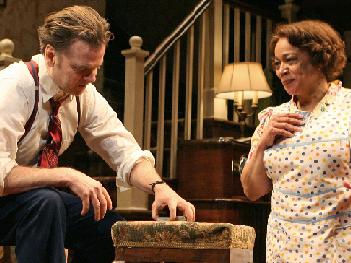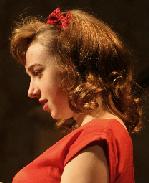SITE GUIDE
SEARCH
REVIEWS
FEATURES
NEWS
Etcetera and
Short Term Listings
LISTINGS
Broadway
Off-Broadway
NYC Restaurants
BOOKS and CDs
OTHER PLACES
Berkshires
London
California
New Jersey
DC
Philadelphia
Elsewhere
QUOTES
TKTS
PLAYWRIGHTS' ALBUMS
LETTERS TO EDITOR
FILM
LINKS
MISCELLANEOUS
Free Updates
Masthead
Writing for Us
A CurtainUp Los Angeles Review
Come Back Little Sheba
|
Little Sheba on Broadway
by Elyse Sommer
William Inge came to playwriting quite late but that arrival brought him immediate and major success as a poetic chronicler of small town lives fraught with loneliness, unrealized longings and hypocrisy. Come Back, Little Sheba was his first Broadway play and it, like Picnic. (which won a Pulitzer), Bus Stop and The Dark at the Top of the Stairs, was successfully brought to the screen. But, like Tennessee Williams, who befriended and helped him during his stint as a newspaper drama critic, Inge's star faded and his works were eventually respected but neglected. Williamstown Theatre Festival capped its mostly British play 2005 season with Inge's Bus Stop (review), but longer running productions of this or any other Inge play have been few and far between. In recent years Jack Cummings III, the artistic director of a young Off-Off-Broadway company, the Transport Group, has been instrumental in calling attention to Inge's work —first with an anthology of his short stories called A Requiem for William and last year with a stunningly different production of The Dark at the Top of the Stairs (The Dark at the Top of the Stairs review and Requiem for William review). However, given the small size and short runs of a downtown company like this, it takes a Broadway revival like the one now mounted by Manhattan Theatre Club to give Inge the comeback he deserves. Happily, New Yorkers are seeing the same beautifully staged Come Back, Little Sheba that Laura reviewed last summer. Not all the members of the California cast have joined Merkerson as Lola and Brenda Wehle as her neighbor on Broadway but the New York cast changes prove to be exceptionally fine. Kevin Anderson invests the role of the frustrated Doc with enough passion and power to banish comparisons with Burt Lancaster of the movie version (Sydney Blackmer was the original stage Doc). You almost hate him for the way he keeps Lola in a perpetual state of nervous insecurity, yet you can't help sympathizing with his tightly controlled feelings of pain and frustration —and when he relaxes enough to let Lola sweet talk him into dancing with her, you see the glimmer of the love that once existed between him and this sweet but simple woman. When the emotions and sexual frustration stirred up in both Lola and Doc by the pretty young boarder become too much for Doc's fragile sobriety, his explosion takes your breath away; and the men from AA insist on his hospitalization, you're reminded of Blanche DuBois' harrowing final scene in A Streetcar Named Desire.
Lyle Kanouse and Matthew J. Williamson reprise their roles as the postman and the milkman who, besides the efficient, squeaky clean Mrs. Coffman (Wehle), are pretty much the only contact the lonely Lola has with the outside world. The new additions to the support cast are just fine. I'm re-posting the Los Angeles review after the Broadway production notes since it encompasses all the reasons this is such a welcome revival. COME BACK, LITTLE SHEBA Playwright: William Inge Director: Michael Pressman Cast (*indicates reprise of LA production): Kevin Anderson (Doc), *S. Epatha Merkerson (Lola), Zoe Kazan (Outsider), Brian J. Smith (Turk), *Lyle Kanouse (Postman), *Brenda Wehle (Mrs. Coffman), * Matthew J. Williamson (Milkman), Daniel Damon Joyce (Messenger), Chad Hoepner(Bruce), Keith Randolph Smith (Ed Anderson), Joseph Adams (Elmo Huston) Set Design: James Noone Costume Design: Jennifer von Mayrhauser Lighting Design: Jane Cox Sound Design: Obadiah Eaves Original Music: Peter Golub Running Time: Two hours, plusone intermission Biltmore, 261 West 47th Street, 212/2396200 From 1/03/08; opening 1/24/08; closing 3/16/08. Reviewed by Elyse Sommer on January 20, 2008. |
— Los Angeles review by
Laura Hitchcock
You won't miss Shirley Booth, the original and inimitable Lola or Burt Lancaster, who played Doc unforgettably on screen, in this stunning revival of William Inge's Come Back, Little Sheba at The Kirk Douglas Theatre. You won't care if S. Epatha Merkerson, despite much twittering in the press, is an African-American woman, playing without comment the wife of a white chiropracter in this 1950 drama. Set in its era and written about a stay-at-home housewife, practically an extinct species today, what you notice in this play is the things Inge did best: perceptive portraits of people struggling to make the best of sad and limited lives, drawn with compassion and the kind of subtle humor that is absolutely realistic.
Lola (Merkerson) and Doc (Alan Rosenberg) married young because Lola was pregnant. They lost both the baby and Doc's plans to become a doctor. Instead he is a chiropractor and when the play opens, one year dry and sober. Lola has gained weight and is sloppy personally and around the house, mourning the disappearance of her beloved dog, Little Sheba.
Crisis builds around their pretty boarder, art student Marie (Jenna Gavigan) and her two beaux, Turk (Josh Cooke), a hunk who models for her life drawing class, and the successful boy back home, Bruce (Bill Heck), whom Marie shrewdly sizes up as the best marriage material. The sexual tension that Inge writes so well is implied from the beginning by director Michael Pressman, as we watch Marie getting up and putting on a filmy negligee in her bedroom while, on the other side of James Noone's superbly sepia-toned multi-level set, Doc says the Alcoholic's Prayer in the kitchen.
As Marie's sex life becomes increasingly the center of the house, with Lola steaming open her mail and taking an innocent delight in watching her with Turk, the pressure drives Doc off the wagon. In a climactic second act scene, he comes home drunk and releases the bile of a lifetime on Lola, verbally attacking her weight and her pregnancy which cost him his career and any future children.
There's a brief third act which makes the play feel like those that offer the audience a choice. You can settle for the dramatic realism of Act II or the return of Doc and the couple's coping mechanisms in Act III.
Inge has a weakness for symbolism, of which Little Sheba (read "lost youth") is only one. There's the phallic symbolism of the javelin Turk wields and wins at and Lola's dreams.
Merkerson's soft voice and loving warmth make it obvious how lucky Doc is to have a wife who begs him to do his trite card tricks repeatedly because she finds them fascinating. Her performance as the maddeningly tender Lola plays both ends of the character with sensitivity and ease. Pressman ends Act II with her turning full face to the audience, expressing a pain so deep we realize she's known for years the things Doc could only verbally express that night. Rosenberg is a master of body language from the get-go when he physically responds to Marie. His Jekyll/Hyde transition from the mild indulgent "Daddy" to a hatchet-wielding monster is devastating.
In the original stage production, Marie was played by Joan Loring, best known to old movie fans for her role in The Corn Is Green where she tells Bette Davis's prize student "There's going to be a little stranger." It destroys his career as surely as Lola's pregnancy destroyed Doc's but the snide knowingness in Loring's tone expresses no loss of innocence. That's written into Marie's part when she pragmatically tells Lola that Turk is for playing the field and Bruce is the better husband. Jenna Gavigan's slight fresh-faced Marie doesn't reach that level of sophistication but she does convey the shrewd hedonism that Lola never had and Merkerson's speechless reaction to it makes one of the play's most memorable moments.
The supporting cast is excellent, with particular vocal splendors from Roger Aaron Brown as Ed Anderson, Doc's AA sponsor, and a perfect Irish brogue from Brenda Wehle as the neighbor Mrs. Coffman, who becomes a friend. Jane Cox's lighting design enhances the sepia tones of the house, heightened by James Noone's back panel projections of its exterior. Peter Golub's original music effects emotional transitions between the acts. More Inge would be welcome, not as history theater of the shuttered 1950s, but as the autopsy of character that never goes out of style.
California Cast: Alan Rosenberg (Doc), S. Epatha Merkerson (Lola), Jenna Gavigan (Marie), Josh Cooke (Turk), Lyle Kanouse (Postman), Brenda Wehle (Mrs. Coffman), Matthew J. Williamson (Milkman), Joe Mahon (Messenger), Bill Heck (Bruce), Roger Aaron Brown (Ed Anderson), Michael Dempsey (Elmo Huston)
California Sound Design: Cricket S. Myers
Running Dates: June 17-July 22, 2007
Where: The Kirk Douglas Theatre, 9820 Washington Blvd., Culver City
Reviewed by Laura Hitchcock on July 8, 2007.

Easy-on-the budget super gift for yourself and your musical loving friends. Tons of gorgeous pictures.

Leonard Maltin's 2007 Movie Guide

At This Theater

 >
>



